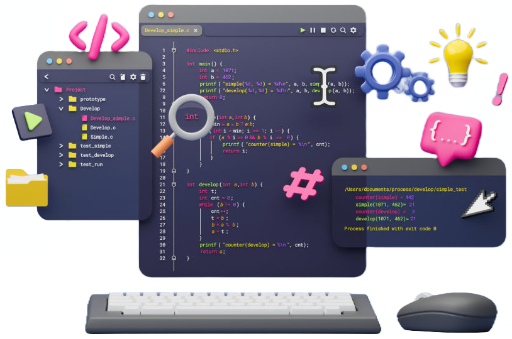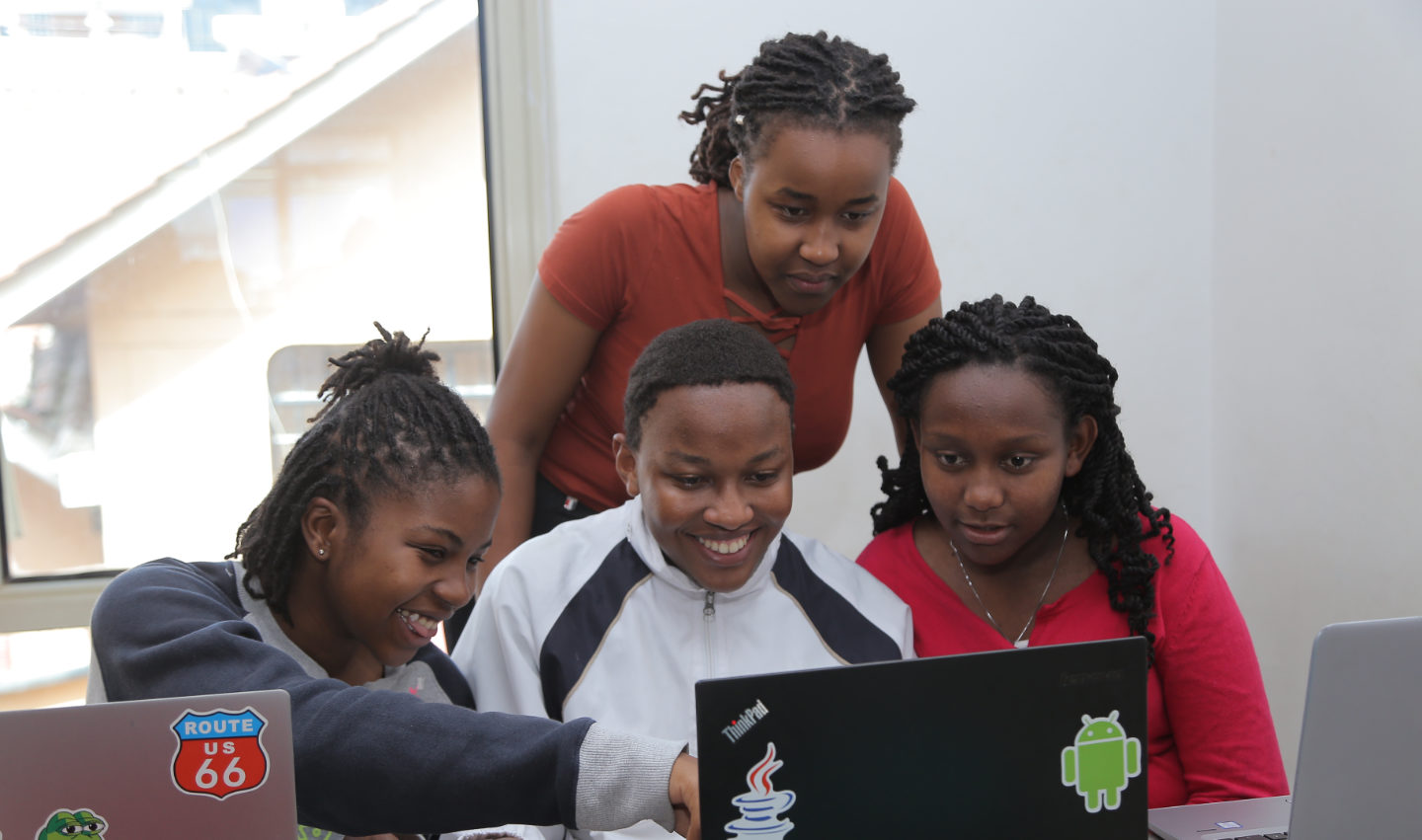Part-time Software Engineering Course

Graduate in Just 30 Weeks as a Software Engineer and Gain Access to 300+ Hiring Partners
Africa’s top Tech Bootcamp – Moringa School partners with America’s Top Tech Bootcamp – Flatiron School, to bring you a part-time Software Engineering Course that puts you on the path to career freedom!
Become a Moringa Certified Software Engineer and enjoy up to 12 months of alumni support from our Career Services Department after graduation.
- Practical Hands-on Learning
Get job-ready with practical, hands-on learning. You’ll learn the in-demand market languages and skills, labs, and real-world portfolio development. - Technical Mentorship
1:1s with your instructor to work on technical concepts, plan out your pacing or check-in about your program milestones. - Learn in Community
You may be learning online, but you’re not alone. You can schedule 1:1s with your instructor for added guidance. - Career Coaching and Graduate Support
Receive career coaching and job-hunting support for up to 12 months post-graduation.
- Working professionals who would like to study in the evening as they learn coding skills.
- University graduates who would like to gain practical experience in the workplace.
- High school graduates looking to get into the tech field.
- University students who want to supplement their degree while studying.
- Tech entrepreneurs who want to learn new languages and skills.
Course Includes HTML, CSS, JavaScript, React, SQL, Python, Flask, JSON, and Redux Frameworks.
The Full-Stack Software Engineering Curriculum covers both Back-End and Front-End programming technologies using Python.
It is an extensive course of study that not only teaches how to simply code but how to learn and tackle novel problems. By the end of your course, you will graduate as a full-stack developer.
- Students will engage in 20-25 hours of learning weekly including one 3-hour lecture per week.
- You can either join live lectures or watch recordings as your schedule allows
- 2-3 hours of learning online each weekday(Evenings on Mon- Fri from 6pm-9pm)
- 8-10 hours of online learning on weekends(Saturday from 9am-12pm)
- You will have 1:1 sessions with your instructor
- Additional helpdesk support on Saturdays from 9 am to 12 pm EAT
Become a certified professional in the most exciting careers of today and tomorrow
Course Details
Find out the pacing options available, the price, and more information about this course.
Flatiron School
30 Weeks
USD 2, 000 (Ksh 200,000)
Installment plans are available on this installment plans document
Online
Course Prerequisites
- All applicants must be 18 years and above and provide proof of ID/Passport
- Have a working laptop that meets the following baseline specifications: Core i5 7th Gen and upwards, 4GB RAM, and at least 256GB of storage.
- Be available to take a part-time course for at least 20 to 25 hours on weekdays and attend 1 live lecture
- Have post-secondary experience ie dilploma+/bachelors
- Suited for working professionals (Not those who are enrolled in another full-time academic program
Software Engineering Curriculum
All students are required to complete an introductory pre-work one week before the start of class. During pre-work, students will get accustomed to our online learning management system (Canvas), set up their computing environment, and familiarise themselves with the basics of the programming languages that will prepare them for day 1 of the program.
Our Full Stack Software Engineering Curriculum covers both Back-End and Front-End programming technologies so you can become a full-stack developer. It’s a more extensive course of study than the average school offers but our goal is to teach you more than simply knowing how to code
To grow as a software engineer, you must be agile and able to learn and adapt, no matter the challenge that you’re given. In our program, you’ll hone communication and collaboration skills, and you’ll become part of the technical community as you build and share a Github portfolio.
Course Modules
All students are required to complete an introductory pre-work one week before the start of class.
During pre-work, students will get accustomed to our online learning management system (Canvas), set up their computing environment, and familiarise themselves with the basics of the programming languages that will prepare them for day 1 of the program.
HTML
Students master the basic building blocks of how the web is rendered and become fluent in the language that makes the web beautiful. They additionally learn how to conceive of and build UIs for web apps by writing well-structured HTML and CSS.
Git
Students explore version control using git commands including cloning, branching, merging, rolling back commits, forking, and submitting pull requests.
JavaScript powers the user experience of the web. Students learn the basics of JavaScript syntax, its functional architecture, and different approaches to the object model. Students then learn the Document Object Model (DOM) Javascript API provided by the browser to dynamically interact with HTML. Students use native “vanilla” JavaScript (versus a library). Students then explore the popular Javascript framework React.
Learners will experience ReactJS, a component-based JavaScript framework, and have the opportunity to pick up key industry skills by building a project that interacts with an API
- Leading Self
- Communicating for Impact
- Working with Others
- Entrepreneurial Thinking
- Project Management
- Career Readiness
You’ll gain a thorough understanding of back-end development basics, while learning a new language, Python. Next, learners will get comfortable with object-oriented programming and storing information in databases using SQL and object-relational mapping.
You’ll master Flask, a Python web framework, before using it to create their own JSON API along with scalable front ends with React, creating slick, functional, and interactive applications.
The program completes with a large-scale group project that will be guided by your technical instructor. You’ll receive plenty of instructor feedback along the way while diving deep into various advanced technologies needed to bring your concepts to life.
To grow as a software engineer, you must be agile and able to learn and adapt, no matter the challenge you are given. Communication and collaboration skills, building a project portfolio on Github, and being part of the tech community are some additional aspects of becoming a successful software engineer. Kickstart your journey with us.
Career Opportunities for our Software Engineering Graduates

Front-end developers create websites and applications that match user needs and expectations. Roles include designing the structure of websites and apps, optimizing for mobile devices, and creating features that promote ease of use.
Front-end developers are good in HTML, CSS, JavaScript, and other front-end frameworks and technologies

Back-end developers create the logic that instructs applications on how to interpret user input and what feedback to give to the user after executing the submitted request.
They are good at creating algorithms that fetch and manipulate data stored in database systems using backend frameworks like Ruby, Python, and SQL.

 Kenya
Kenya  International
International 